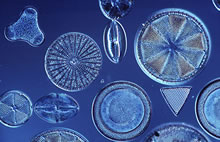Tuesday, September 16, 2014 9-12, lunch to follow 222 W 7th Ave, Federal Building room 552
The National Oceanic and Atmospheric Administration (NOAA) is developing an Ecological Forecasting Roadmap and program manager Allison Allen will be in Anchorage on Tuesday Sept. 16 to hear from key researchers and stakeholders about existing efforts and needs across Alaska. Please join us in person or remotely (log-in info below) to hear the latest state of the science on Harmful Algal Blooms, pathogens and other environmental change. Discussion will focus on identifying priorities for developing operational tools in Alaska, scenario modeling, early warning systems and forecasts of marine events. We invite you to join us for lunch following the formal presentation for an opportunity to continue the conversation informally with Allison. Please RSVP to tyler@aoos.org by Sept 10.
Agenda
- What is the NOAA Ecological Forecasting Roadmap & what does it mean for Alaska? Allison Allen
- HABs in the Ecological Forecasting Roadmap, Rick Stumpf
- State of the Science/ HAB Forecasts in Southeast and Southcentral AK, Kris Holderied
- Discussion: Is forecasting for HABs different in AK than elsewhere in the lower 48? If so, how can the roadmap be both inclusive and standardized?
- Pathogens in the Ecological Forecasting Roadmap, John Jacobs
- State of the science/ pathogen monitoring, TBD
- Discussion: When do you move from research and monitoring to developing a forecast and taking action?
- Species distribution and habitat change in the Ecological Forecasting Roadmap, Howard Townsend
- Invasive species and range changes – overview of trends and research in AK, Gary Freitag
- Downscaling climate projections and relevance through the food web, Nick Bond
- Discussion: How to prioritize ecological research and forecasting efforts?
- Brief overview of “infrastructure” in the roadmap, Chris Brown
- Final discussion and wrap-up
“The health of our coastal communities, economy, and ecosystems depend upon our understanding of complex and constantly changing conditions. Hazards such as pollution, extreme weather events, and climate variability are daily realities for the growing number of Americans who live in U.S. coastal shoreline counties. At NOAA, we’re taking proactive steps to prepare for future conditions to help our nation become more resilient.” – NOAA Ecological Forecasting Service
__________________________________________________________
FAQs:
What is an Ecological Forecast? “An ecological forecast predicts changes in ecosystems and ecosystem components in response to an environmental driver such as climate variability, extreme weather conditions, pollution, or habitat change. It also provides information about how people, economies, and communities may be affected. Local authorities and members of the public use these early warnings to make decisions to protect the health and well-being of a particular area.”
– oceanservice.noaa.gov/ecoforecasting
Where can I learn more about the NOAA Roadmap for Ecological Forecasting? Check out www.oceanservice.noaa.gov/ecoforecasting
What if I can’t make it in person? Don’t worry, this meeting will be webcast and you can participate remotely by following these instructions below:
Webex Topic: Ecological Forecasting Webinar
Date: Tuesday, September 16, 2014
Time: 9 am – 12 pm, Alaska Daylight Time
Meeting Number: 623 464 011
Meeting Password: roadmap
——————————————————-
To join the online meeting (Now from mobile devices!)
——————————————————-
1. Go to https://aoos-nprb.webex.com/aoos-nprb/j.php?MTID=mfb01fe4dd9c18cfff60163e296602f64
2. If requested, enter your name and email address.
3. If a password is required, enter the meeting password: roadmap
4. Click “Join”.
——————————————————-
To join the audio
——————————————————-
1. Dial 1-866-779-5968
2. Enter pin: 1694

